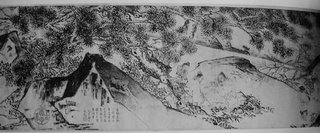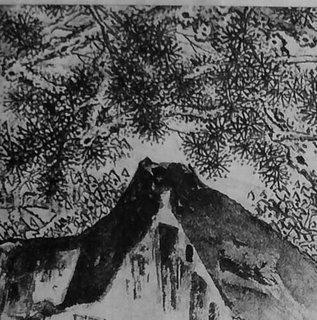The Four Scholars of Mount Shang
 Ma Yuan, 1190-1225 Southern Song Dynasty (section shown above is the left half of the scroll)
Ma Yuan, 1190-1225 Southern Song Dynasty (section shown above is the left half of the scroll)This site is dedicated to those four Taoist luminaries of the early Han Dyanasty: Dongyuan, Luli, Qi Liji, and Xiahuang -- also known as the Four Scholars of Mount Shang.
I first met them about 40 years ago in Cincinnati --- where my father repeatedly pointed out the well-deserved reputation of this famous painting -- stamped with the colophon of the great Qianlong emperor, and kept in the Forbidden City until it was stolen during the civil wars of the 20th century. It ended up in the collection of one of the many dealers in Chinese antiquities whose careers ended when the Red Army sealed off the borders. His friendship with the young director of Cincinnati Art Museum, Philip Adams, gave that museum the opportunity to make this important acquisition ( my father being privy to all this since Adams had hired - and eventually had fired - him as sculpture instructor at the Art Academy that was then a division of the art museum.)
Oriental arts occupy a dark, distant wing of the Cincinnati Art Museum --- and I was only too happy to share in its lonely, arcane secrets - and identify with those four ancient sages who were too good for the sex/power/money hungry world of corrupt men -- so they retreated to remote Mount Shang where they ate purple mushrooms and played board games to pass the time (just like me and my friends playing "Risk" on the floor of Mark Mehas' bedroom)
That's the Taoist myth -- and as a Thursday night Taoist, I subscribe whole-heartedly.
But -- as Paul Harvey would say -- there's another side to this story -- because these four erudite scholars were also mentioned by the first-and-greatest Chinese historian, Ssuma Chien, who was born no more than a hundred years later. The Roman empire had it's great historian - Livy -- and everyone knows that he was a shill --- sucking up to his patron, Augustus Caesar. But the integrity of Ssuma Chien is beyond question --- since he angered the emperor so badly, that he was forced to suffer the ultimate indignity: castration -- and the moment he lost his manhood, he gained forever the respect of his readers for generations to come.
According to Ssuma Chien, the four scholars did indeed retreat to Mount Shang in disgust over the venial consolidation of power by the administration of the first Han emperor.

But when it came time for the emperor to designate his successor, his first wife, the legendary evil Empress Li, was desparate to advance the fortunes of her son because he was a gentle soul -- but a knucklehead. Well -- maybe not that bad -- but he definately lacked the extraordinary talent that the job of emperor requires -- and even though he was the first -- Chinese custom allows succession to follow ability -- and the emperor already had selected the ablest of his sons (the one he thought most resembled himself) from another of his many wives and imperial concubines.
Going to the most loyal and astute of the emperor's advisors, the Empress asked how she might advance her son's career ---- and the only hope that he could offer was: get the four scholars of Mount Shang to live in the prince's palace. That would elevate his standing in court -- and move him to the center of attention. The Empress then asked how these four worthies could be persuaded to come down off the mountain -- and the advivor's reply was simple: offer them money. The Empress replied that everyone knew that the four scholars -- like all Taoist adepts -- eschewed money --- and considered it useless. But the advisor -- proving the depth of his wisdom -- suggested that the only reason the scholars were still alone on that cold mountain was that nobody had yet offered them ENOUGH money -- and being in a position to do so -- the Empress got the scholars to move into her son's palace --- the balance of power shifted in her favor -- her son was named Emperor designate -- succeeded to the throne -- his half-brothers were all destroyed -- and eventually the Empress ruled by herself for the next decade.

So there you have it -- both legend and history have lived side-by-side for 2000 years -- and why not ? The Four Scholars are still admirable -- because even if they did sell out -- it was only when someone was willing and able to meet their price -- otherwise they were quite content to play chess all day and eat purple mushrooms.
And so am I.

Jade Four Sages Mountain boulder
1779
31.5 inches


5 Comments:
A great story, Chris!
To swap similar stories -- I have often thought about Francis Bacon, the Elisabethan scholar and bureacrat who wrote an essay (the title now escapes me) with this portent: career, money, power -- these things are not worth the trouble. the men who pursue them know them to be vain and only want them because other men want them. in this they live by borrowed ideas. an interesting essay -- and one which I have put into practice myself. but Bacon apparently didn't!
You have your cyber-cafe (Heaventree), and I have my cyber Mount Shang, dear Gawain -- and I suppose they both amount to the same thing: old guys blowing smoke and having fun. Please continue to contribute your stories and observations -- as it seems that I continue to remember them. May I serve you some more purple mushrooms ?
Do you know those lines inspired by a little sculptural object--that triumphant, perfect poem, "Lapis Lazuli"? It trickled through my head as I read your account of Mount Shang--the connections to the jumble of violence and strife and tragic motions of history, set next to the image of the four scholars seated above, playing board games and eating purple mushrooms. The Yeats poem has the very same sense of the tragedy of history and human life, but rises past it into rejoicing--ending with two ancient "Chinamen" climbing a mountain, who pause and stare at "the tragic scene," and then begin, in gaiety, to play "mournful melodies."
They probably have a game board and a sack of mushrooms, too!
You probably know that poem, but if you don't--how delightful to read it for the first time by the chess board, next to a bowl of purple mushrooms.
Yes- thankyou Marly, it is delightful to put that poem into this context -- or to put me and Gawain into that poem -- and no, I don't remember ever reading it before.
BTW --- it took me some time to follow it -- it only made sense as I imagined the speaker to be a third, very crusty, very tired, old guy sitting up there on the mountain with us --on the eve of the Second World War.
I'm so glad you've reading -- and commenting -- on all these old posts of mine.
I've ordered your third book (Wolf Pit)-- and can't wait to start commenting on some your earlier writing as well.
Oh, that seems a very good way to read it... Grown old and weary-hearted, yes, but determined to be passionate and alive to the very last breath: that's Yeats, I think.
Yes, I've been rioting about through the posts and will come back and revisit them. Such fun! I like this sort of blog--wandering, speculating, bursting of images. When I have an idle moment, I can whip over to a wing of the Museum of Chris Miller. And Amanda is interesting; so romantic and determined. I haven't visited the rest of your crew but shall have to, some day.
Lovely of you to order a book!
Post a Comment
<< Home